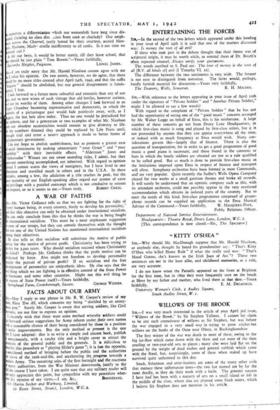Snt,—As neither Duke nor Belted Earl has taken up the
gage flung dos by Sir Robert Greig In The Spectator, may I give a different, and venture to think more useful, turn to the discussion by urging the disu of the quite meaningless distinction between Mr. and Esq.? (Mr. Hare! Nicolson, I see, made the same suggestion m his "Marginal Commer: last week.) Not many of us are much troubled one way or the othe by the titles of the hereditary peerage, our intercourse with Dukes bear limited ; but with Misters and Esquires we are by correspondence constant touch, and to many it "A a daily problem which of their corn spondents is which. Clearly we shall be in trouble with the " Squire- we address him Mr. ; our gardener, on the other hand, will mere]) puzzled if we address him Esq.
Just fifty years ago the problem first came to me. I was staying in Easter vacation at a Berkshire farmhouse reading for Greats ; a d cratic friend was similarly occupied on Law in Oxford. One day a lett came from him to say he would walk over next day, addressed "Mr. James, c/o Mr. Tom Simmonds, Letcombe Basset." When he came, told him I would have his blood if he " Mistered " me again. A f days later a letter came " L. James, Esq., c/o Tom Sinunonds, Esq." lesson went home. But it was not till many years later that the n came to apply it seriously. Leaving Radley, where all were Esq., f the smallest " squit " of a mere boy to the Warden (who was delighted once to find himself addressed " The Rev. Dr. Field, Esq."), I mm to Monmouth, where parents were not by any means all of one "class. At once the envelope problem confronted me with all its terrors ; in I was safe, all parents being alike Mr. (or Mrs.), but the envelope! Which of them was Esq., which merely Mr.? There could be but complete solution; all must alike be Mr. or all Esq. The former risk deadly offence to those who were of right Esq.; the latter enobled ra and file. Of this dilemma I grasped the safer horn, and thenceforth addressed all parents Esq. Seriously, Sir, has not the time come to end this rather absurd differen- tiation? Once it had a meaning; now it has none. Our knights no longs go out to battle attended by squires. The extension to those holding the King's Commission has long been overflown. One used to be told that members of " the learned professions " ranked as Esq. Are schoolmasten., a " learned profession " ? And are schoolboys ? Not long ago I was told by a friend, whose small boy had just entered one of our Public School', that he was " bound" to address him as "Esquire." Logically should not rather be "Page"? And our wives? Legally, political/. Fro' fessionally they are now our eauals. Need we men persist in asserting ourselves a differentiation •which our womenfolk have long since dis-
claiming no class dist. ,..lion from cook or charlady? Our neigh- s across the Channel, justly famed for their courtesy, accord Mon- . Madame, Made oiselle indifferently to all ranks. Is it not time we wed suit ?
As for our boys, it would be better surely, till they leave school, that should be just plain " Tom Brown."—Yours faithfully,



























 Previous page
Previous page